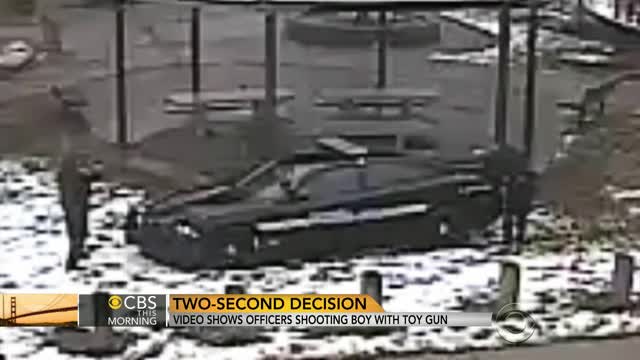 |
| The prosecutor said these cops followed proper procedure. Will Cleveland keep that procedure in the rule book? If not, what does that say about the old system?. |
In the realm of "What the hell were they thinking in the first place?", cops have shot and killed over 1,100 people in the course of 2015. We know this number not because it was "proper procedure" for law enforcement to keep such numbers but because the Guardian and the Washington Post, among other media outlets, chose to build and publicize a database in light of the infamous shooting of Michael Brown, the choking death of Eric Gardner, and the astounding accounts of police shootings getting reported across the nation this past year or so.
Do we get that? No one used to keep a proper count of police shootings until, what, the ubiquity of cell phones with video capabilities? Really? The answer, apparently, is yes. We do know that, in the wisdom of the U.S. Congress under pressure from the NRA, it was made illegal back in 1996 for the Centers for Disease Control to investigate shooting deaths as a public-health issue, a law that stubbornly remains on the books. Really?
Really.
And, like all previous incarnations of the clash over police force, the debate remains absent access to a crucial, fundamental fact.
Criminal justice experts note that, while the federal government and national research groups keep scads of data and statistics— on topics ranging from how many people were victims of unprovoked shark attacks (53 in 2013) to the number of hogs and pigs living on farms in the U.S. (upwards of 64,000,000 according to 2010 numbers) — there is no reliable national data on how many people are shot by police officers each year.
The government does, however, keep a database of how many officers are killed in the line of duty. In 2012, the most recent year for which FBI data is available, it was 48 – 44 of them killed with firearms.
But how many people in the United States were shot, or killed, by law enforcement officers during that year? No one knows.
Officials with the Justice Department keep no comprehensive database or record of police shootings, instead allowing the nation’s more than 17,000 law enforcement agencies to self-report officer-involved shootings as part of the FBI’s annual data on “justifiable homicides” by law enforcement.How was that "self-reporting" working out? Not well, apparently.
Okay. So we know that we didn't know enough to understand the scope of the problem of police-on-citizen violence, we can at least take solace in the fact that police are trained to use guns as a last resort. Except that we can't because they are trained to shoot to kill and shoot to kill quickly.
Tamir Rice was shot withing two seconds or less of police arriving on the scene. The prosecutor reported this past Monday that patrolman Timothy Loehmann had reason to fear for his life, thus justifying the shooting.
And yet, police, mayors, and other say there are "lessons to be learned." For example:
The Cleveland Police Patrolmen's Association said it was pleased by what it called the grand jury's "thoughtful decision." But Steve Loomis, the union's president, said the decision not to indict the officers was no cause for celebration.
And Cleveland Mayor Frank Jackson feels his city needs to change its policies:"While there is absolutely no upside to this issue," he said in a statement, "there are lessons that should and will be learned by all."
“This has caused the city of Cleveland, with the loss of a child at the hands of a police officer, to do a lot of soul searching,” Mr. Jackson said. “And in the midst of that soul searching we have made some changes.”
 |
| Don't worry, we're making changes we never thought of before. |
A statement from Mayor Rahm Emanuel's office said Emanuel and Interim Police Superintendent John Escalante will have a news conference at 2 p.m. Wednesday to announce "a major overhaul" of the policy regarding how officers respond to incidents and the use of force.
The statement said the department will also begin to require every officer who "responds to calls for service" to be equipped with a Taser and trained to use it by June 1, 2016.Alrighty then, as long as you make changes you could have made long ago, it's all good. Except that it's not. This same mayor and this same Chicago PD fought for nearly fourteen months to prevent the McDonald video from public viewing. When that effort finally failed and the video became public, only then was the officer quickly indicted.
We're left to assume that the reason police training and police procedures need to change is that the public is finally learning, through videos and statistics, the extent of police brutality that has been tolerated -- even accepted as a fact of life -- all these decades. As violent crime has fallen significantly, police deadly shootings have risen. Huh?
This whole thing stinks. We're getting a new peek at a very old problem, and politicians want "changes." What they want is to cover their asses. Grotesque in the extreme.
Salon takes a sober look at the Tamir Rice case and makes a grim -- and true -- assessment:
The decision to not indict officers in Tamir Rice’s death has understandably sparked outrage. But if the officers didn’t commit a crime, then the conclusion to be drawn is actually far more radical and serious: institutionalized policing practices and policies killed a 12-year old child.No amount of "soul-searching" can change that.

No comments:
Post a Comment